Dual international talks of time in both "rugbies".
Amidst such a ferocious turf-war-type environment, with all four of Australia’s “footballs” fighting for every last dollar of TV rights money and every bum on a seat they can get, it can be easily forgotten that there are fans out there who actually love more than one code of football. Shock horror, hey? If you have a strong preference for the rugby codes, you’re in for a treat over the next month and a half. Just as the NRL season starts determining its grand-finalists, the Rugby World Cup steps in to keep the footy feast well and truly alive. One of the few men who will be able to identify with every player from both codes is Mat Rogers, a dual international for the Kangaroos and Wallabies. Starting out as a promising union junior, he made the switch to the 13-man game as a 17-year-old, enjoying a stellar club career with the Cronulla Sharks and with the Maroons and Australia at rep level. When he made the switch back to union in the early 2000s, it was as if he hadn’t left, starring for the Waratahs and Wallabies almost instantly. Same story when he switched back to league again in 2007 and ended up at the Titans to finish off an amazing professional football playing career. With such a massive rugby-code smorgasbord ahead, we asked Rogers, now enjoying life on the Gold Coast, what it was like to achieve success in both games. We even managed to steal a Rugby World Cup prediction from him too ...
You’re a busy man these days, and you kick it all off in the morning with something called The Rat Pack. What’s that all about?
It’s a training group I started about four or five years ago. I’d been going on the odd training run with some friends and eventually we thought about running a marathon together. One of the guys mentioned one day that marathon groups are a great way of raising money for charities. My wife Chloe and I had actually started a charity about eight months earlier, 4 ASD Kids. The suggestion got me thinking about starting up a group where could train people, and then all run a marathon together and raise some money. But it grew into a beast ... we actually have our own shirts now. It’s just a bunch of people with good hearts who all want to do something good. There are no egos or supreme athletes amongst us. Everyone is welcome to come along and join, as long as you don’t have an ego or you don’t want to bring your problems with you. I think last year we had over 100 members. We train a few times a week down at Burleigh. We do any number of things. Sometimes we run trails, we cycle, swim ... and we drink a lot of coffee. It’s low-key fitness and high-key social. The training sometimes gets in the way of our social activities ...
This year you took the plunge and went Dancing With The Stars. How did you handle the challenges a gig like that tosses up?
I just thought, "If I’m going to do this, I don’t want to make a fool of myself." I was determined to produce something that looked a little bit like dancing. I remember saying to my dancing partner, Ash: "I don’t want to look like a footballer trying to dance: that’s your job." And she said, "Alright, we’ve got some work to do then." That was cool with me. I was happy to do that. It was a lot more exciting and fun than I thought. I had actually knocked it back in years gone by, but they must’ve got me in a weak moment this year because I said yes. When any of my footy mates ask me about it, I tell them straight out: you gotta do it. All the people are amazing. It has done wonders for our charity as well, gained a lot of traction. That was basically the main reason for my going on the show. It has exposed 4 ASD Kids to a lot more people than I could have personally.
We’ve heard you’re a budding sporting administrator and that you’d like to try some of your theories out on the struggling Gold Coast Titans. What are some of your central ideas?
The hardest thing is getting those ideas across without sounding disgruntled. I know a lot of people at the club, like Paul Donovan and Rebecca Frizelle, who are on the board and are highly respected business leaders who I have an enormous amount of respect for as well. But the one thing they don’t have is experience around football teams. From the age of four, I’ve been surrounded by football teams and players, in a professional manner and at the amateur level. From my Dad, all the way through to now, I’ve been surrounded by football. And I have a pretty fair idea of what makes a good club tick; when the community sees a unified front, the community supports you. When I say unified front, that doesn’t mean the administrators coming out and saying “we’re all going good” ‒ that means a front presented by the players, the administrators, down to the waterboys. It means every single person having a vision for what this club should be and being on the same page. I think the Titans have made some great steps moving forward. They’ve made the tough calls, moved some people on, but from my standpoint, I just think what the club might be lacking, from a board perspective, is someone with the knowledge of the intricacies of how the players feel and how to get the most out of them. Just one example, the players need to know the importance of promotional work and understand why it’s so crucial we engage the community and bring people back to the game. I know, I’ve done it, I was there ... It’s easy to sit there as a player and think, "Why do I have to go and do this, why do I have to do that?" ... But if you had an ex-player coming in and helping the players understand why it’s so important, I just think they’d listen with a different ear. Not that you’d say things all that differently, but I think the respect from the players would be different, based on what you’ve done.
You were a super-talented rugby union teenager who switched to rugby league in the mid-1990s. Can you remember the moment when you thought league was ultimately the game for you?
I do. It was when I did the rounds talking to the various local rugby clubs in Brisbane. Their set-ups weren’t professional, but a few of them did say they could get me a job. Cronulla, on the other hand, were going to pay me to play football. As a 17-year-old kid, when you’re dealing with the club your Dad played for, and they’re offering you a car, and to fly you down and set you up once you’ve arrived, it wasn’t a very hard decision to make, really. I didn’t love one game more than the other; it was never about leaving rugby because I didn’t like it. If rugby was professional at the time, I could’ve easily stayed in it. When I switched, I was a member of the Australian Schoolboys, so playing-wise there was definitely an opportunity to stay in rugby.
How much had rugby union changed in the way it was being played by the time you switched back in 2002?
To be honest, nothing had really changed for me. For example, I didn’t have to change the way I ran the ball. I had to be a little bit more aware of isolating myself, but apart from that ... It wasn’t like I’d forgotten how to play. I just tried to catch the ball and beat people, that was it. Switching from one code to the other really wasn’t that much of a big deal, to be honest. It was made into a big deal, but I knew I could do it. I was super-excited about being given the chance to switch back because I’d been stuck on the wing for many years in rugby league. I’d spent my whole teenage life as a fly-half: every time your side got the ball, it came to you. But my club coaches in league weren’t going to move me. I remember one of them saying, “Look, I understand you want to play in-field, but you’re the best winger we’ve got, so I’m not going to change it around.” The death knell for my league career at Cronulla was when Chris Anderson arrived. He was a good friend of mine and was the Australian coach at the time. I had a meeting with him and I said, “Mate, I want to play five-eighth.” He said, “You’re the best winger in the country. If you re-sign here with me, you’re going to be playing on the wing.” I walked out of the office that day and set up a meeting with the ARU. They talked about me playing fullback, fly-half, centre and I was excited. There was no money talked about. If you’re at that level you know you’re going to get paid, so it wasn’t about the money. I had a great five years playing rugby, then got a bit jaded, I guess. I was very fortunate to have the opportunity to come back to the Gold Coast.
During your elite-level union years were there any league players who spoke to you about making a swap to union?
Not really. There are many similarities between the two sports, but they have vastly different cultures. If you’re not enjoying life outside the game, it’s hard to get the best out of yourself within the game. So while there’s a bunch of talented rugby league players who probably could switch over, you have to think: why didn’t they? And the answer is probably because they didn’t want to. We’ve seen players change and not make it. One player in particular who I played with, Nathan Blacklock, was a phenomenal athlete, an outstanding rugby league player. But culturally, he just couldn’t get into the whole rugby union thing, sort’ve didn’t quite reach his potential in rugby union that I thought he could have. With all the talk surrounding Jarryd Hayne lately, people are starting to say that lots of rugby league players would be able to go over there and make it in the NFL, too. But I doubt it. Jarryd is a pretty unique individual. It’s not a case of just thinking to yourself: "I can run fast, I can beat a player, so I could go over and do that". Nup, it’s not that easy. There’s a lot more to it. Darren Lockyer, could he have made it in rugby union? I think he could have, so why didn’t he? Because he didn’t want to. There’s got to be that desire to do it. That’s as just important as the talent.
No matter how awkward their form in the years leading up, Australia always seems to reach the really important games at Rugby World Cups. Why is that?
I think Australians are good at rising to the occasion. I guess we’re not the underdogs in many sports, but rugby is probably an exception considering the powerhouse that New Zealand is. They’ve tended to crumble under pressure in the past and we’ve tended to rise up. But I’m not sure what it is. In the 2003 World Cup we were definitely the side that kept getting better. I think we were a smarter side back then than New Zealand was. They played a really exciting brand of football, but they could only play that brand of football. And when it came to the World Cup tournament, that didn’t change. They’d beaten us by about 40 points in the first Bledisloe that year but only beat us by one point in the second. After that second game at Eden Park, we came off the field thinking, “We know how to beat these guys.” We just knew we couldn’t give them any broken-field play. We kicked the ball out properly, didn’t give them any quick line-outs, didn’t drop the ball. We just held the ball, didn’t turn it over. We knew if they couldn’t get broken-field play, their set piece couldn’t beat us. And that’s the way it went at the World Cup.
What does your crystal ball say about this year’s tournament?
New Zealand and Australia, they’re the ones you have to watch out for, but you just don’t know, and that’s the exciting thing about the Rugby World Cup. New Zealand has floundered so many times. And while they’re the dominant side in world rugby, and have been for the last few years, they also have an ageing side. I would love to think Australia is good enough to win it, and they are. They can beat anybody on their day and have proven it in the Rugby Championship. You have the likes of Israel Folau, who is in his absolute prime. You’ve got blokes the size of Will Skelton in the pack who can just dead-set terrorise people. And then you have experience; guys like Matt Giteau floating around. And although Quade Cooper didn’t have an overly happy Bledisloe experience this year, you can’t go past his talent. And then you’ve got guys like Bernard Foley. He probably doesn’t have the skill level of Cooper, but the way he steers the football side around the field is phenomenal. He’s just so calm and gets the job done. So there’s a bit of a job ahead for Michael Cheika’s side, but I can’t go past Australia if you want me to pick a winner. Great job by the ARU as well in relenting on its foreign player policy, which means overseas-based club players can now come back and play for the Wallabies. This can only strengthen Australia’s rugby depth. When a guy like Giteau goes and plays overseas, someone else has to step into the void here, and they have to lift. This in turn means Australia instantly has another player who needs to develop and progress to that next level.
Will we ever see a hybrid version of the two rugby codes played at an elite level, or is that just a fantasy?
Rugby league is already a hybrid version of rugby union. I just don’t think it would ever work. Any rugby union side would destroy a rugby league team if you want to play line-outs and do scrums properly, and any league side would destroy a union team because league players are different types of athletes to most rugby players. You don’t have to be six-eight and jump up in line-outs and all that stuff.
Related Articles
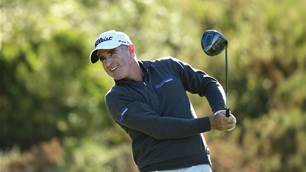
Video interview: Drinks With ... Matt Millar

'Worlds best rugby sevens' could play NRLW
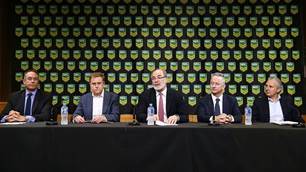

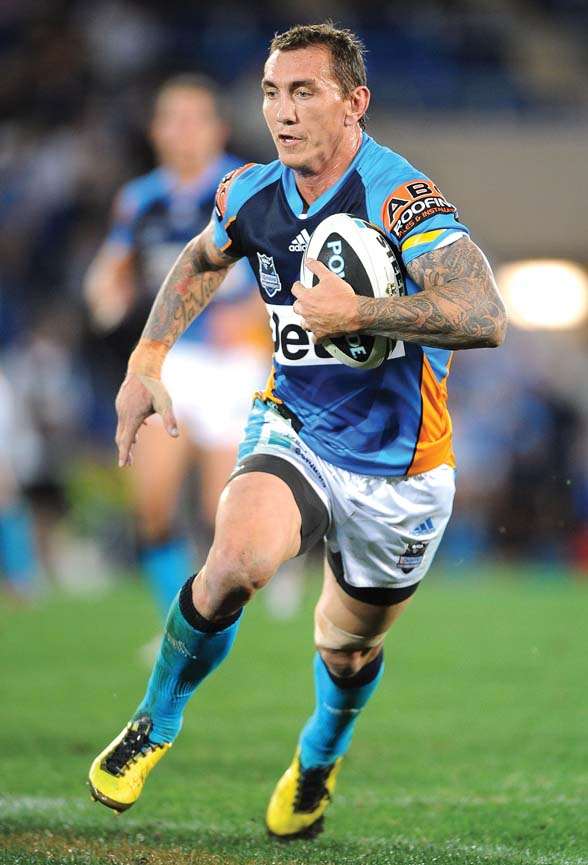
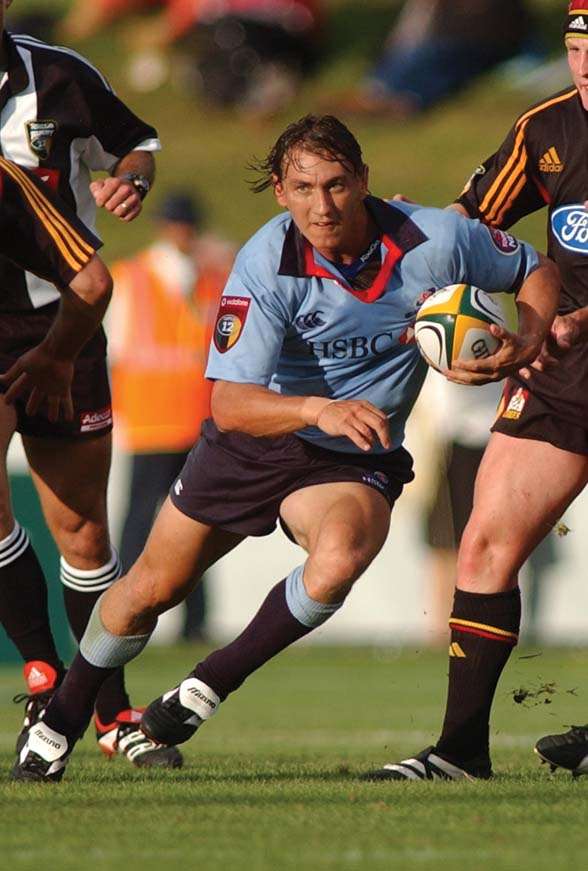
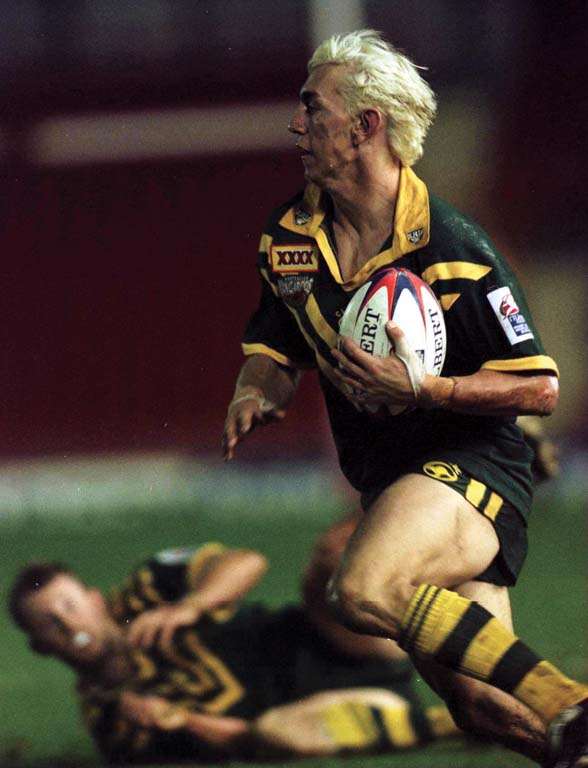
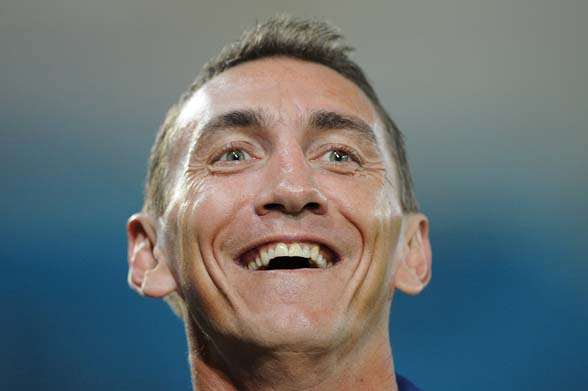
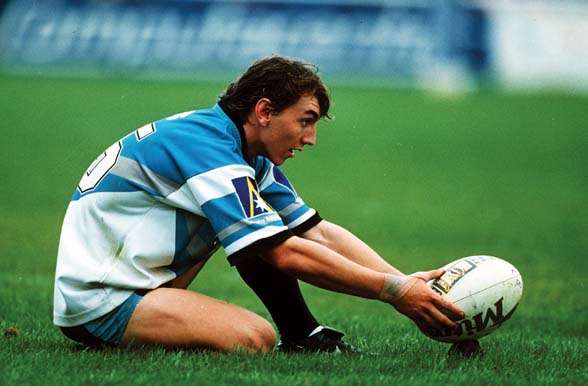
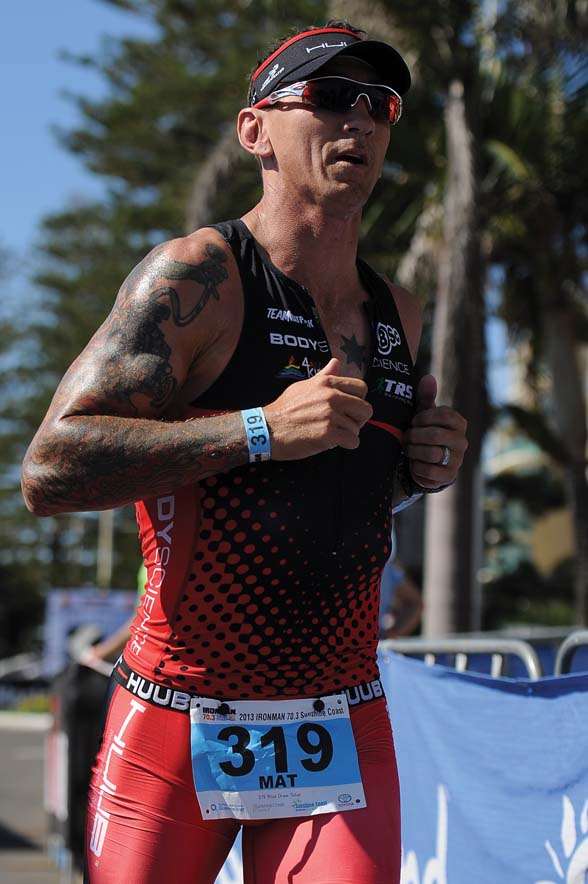
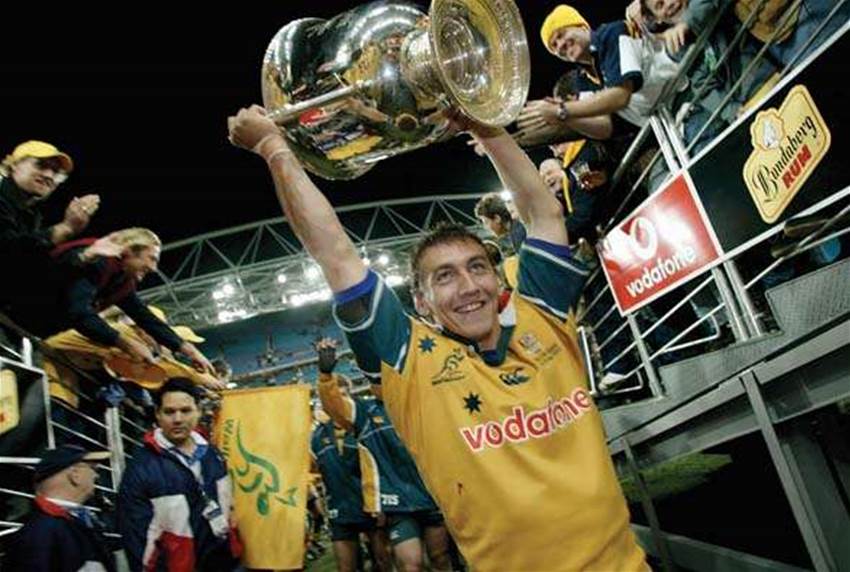
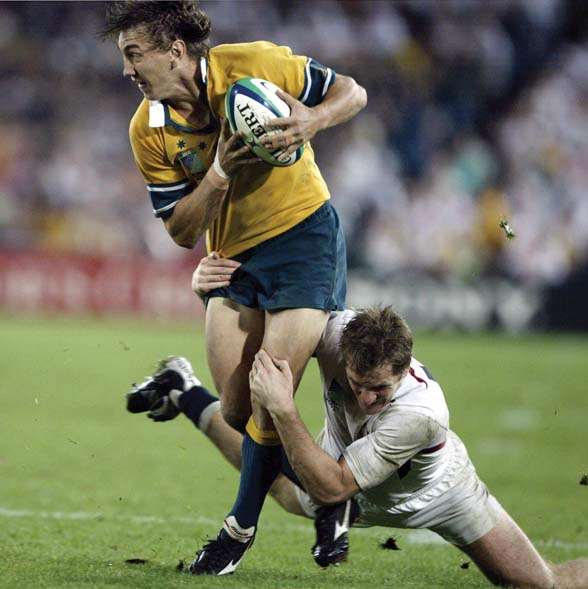
.png&h=115&w=225&c=1&s=1)










